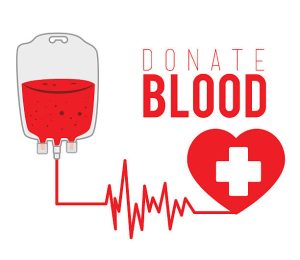The World Health Organization, (WHO) celebrates blood donation day around the world every 14th of June. This year, World Blood Donor Day event serves to thank voluntary, unpaid blood donors for their life-saving gifts of blood and also to raise awareness of the need for regular blood donations to ensure that all individuals and communities have access to affordable and timely supplies of safe and quality-assured blood and blood products, as an integral part of universal health coverage and a key component of effective health systems. The host country for World Blood Donor Day 2019 is Rwanda.
WHY SHOULD I DONATE BLOOD?
A blood donation occurs when a person voluntarily has blood drawn and used for transfusions and/or made into biopharmaceutical medications by a process called fractionation. Donation may be of whole blood, or of specific component directly.
Donating blood can help in treating patients suffering from cancer, bleeding disorders, chronic anaemia associated with cancer, sickle cell anaemia, and other hereditary blood abnormalities. It is important to know that human blood cannot be manufactured, people are the only source of it and that is why it is important to donate blood and help those who need it.
WHAT DO I BENEFIT FROM DONATING BLOOD?
Prevent Hemochromatosis: Health benefits of blood donation include reduced risk of hemochromatosis. Hemochromatosis is a health condition that arises due to excess absorption of iron by the body. This may be inherited or may be caused due to alcoholism, anaemia or other disorders. Regular blood donation may help in reducing iron overload. Every blood donor must meet the standard blood donation eligibility criteria.
Anti-Cancer Benefits: Blood donation helps in lowering the risk of cancer. By donating blood, the iron stores in the body are maintained at healthy levels. A reduction in the iron level in the body is linked with low cancer risk.
Maintains Healthy Heart & Liver: Blood donation is beneficial in reducing the risk of heart and liver ailments caused by the iron overload in the body. Intake of iron-rich diet may increase the iron levels in the body, and since only limited proportions can be absorbed, excess iron gets stored in heart, liver, and pancreas. This, in turn, increases the risk of cirrhosis, liver failure, damage to the pancreas, and heart abnormalities like irregular heart rhythms. Blood donation helps in maintaining the iron levels and reduces the risk of various health ailments.
Weight Loss: Regular blood donation reduces the weight of the donors. This is helpful to those who are obese and are at higher risk of cardiovascular diseases and other health disorders.
Stimulates Blood Cell Production: After donating blood, the body works to replenish the blood loss. This stimulates the production of new blood cells and in turn, helps in maintaining good health.
BEFORE DONATING BLOOD
Adults below the age of 18 and above 65 and with weight lower than 110 lbs cannot donate blood. A person with active infection, acute infection or diseases like HIV AIDS should not donate blood. It is advisable to consult a doctor and share medical history before going for blood donation.
Consult your doctor before donating blood if there are any health issues or concerns. It is always good to have a healthy diet weeks before the donation.
HOW OFTEN CAN I DONATE BLOOD?
A blood donor must wait for 56 days or 8 weeks between whole blood donations. The waiting period is 112 days or 16 weeks between power red donations.
WHO CAN DONATE BLOOD?
You are aged between 18 and 65.
- In some countries national legislation permits 16–17 year-olds to donate provided that they fulfil the physical and haematological criteria required and that appropriate consent is obtained.
- In some countries, regular donors over the age of 65 may be accepted at the discretion of the responsible physician. The upper age limit in some countries are 60.
AFTER A BLOOD DONATION
- Drink extra fluids for the next day or two.
- Avoid strenuous physical activity or heavy lifting for the next five hours.
- If you feel lightheaded, lie down with your feet up until the feeling passes.
- Keep the bandage on your arm and dry for five hours.
- If you have bleeding after removing the bandage, put pressure on the site and raise your arm until the bleeding stops.
- If bleeding or bruising occurs under the skin, apply a cold pack to the area periodically during the first 24 hours.







